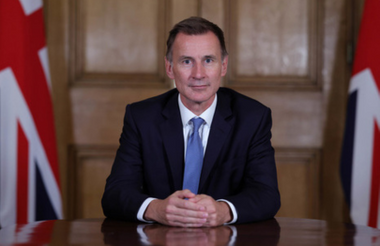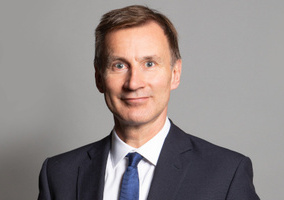With a looming general election and promises to reset the relationship between the government and the charity sector, many were nervously awaiting chancellor Jeremy Hunt’s spring budget.
Hunt delivered his budget for long-term growth yesterday, with pledges of lower taxes, more investment and better public services.
His first announcement was on households on Universal Credit taking out budgeting advance loans to pay for costly emergencies such as boiler repairs and help to get a job.
To make such loans “more affordable”, Hunt promised to increase the repayment time for new loans from 12 to 24 months.
“For some people, the best way to resolve debts is through a debt relief order. But getting one costs £90 which can deter the very people who need them the most,” he said.
“So having listened carefully to representations from Citizens Advice, I relieve pressure on around 40,000 families every year by abolishing that £90 charge completely.”
Hunt also said he had “listened carefully” to representations from the Joseph Rowntree Foundation and Trussell Trust when he moved onto the government’s Household Support Fund.
It was first announced in September 2021 as a £500m funding pot to help vulnerable households with essentials over the winter, originally running until March 2022 before being extended twice, each time by an extra year.
In this year’s budget, Hunt said he had decided that, with the country still battling high inflation, now was not the time to stop the targeted help the fund offered.
“We will therefore continue it at current levels for another six months,” he added.
Some charities welcomed the short-term extension of the fund, but argued that it fell short of what is needed to protect households experiencing financial hardship from high costs.
As Pro Bono Economics (PBE) chief executive Matt Whittaker pointed out, there was “little else” in the budget besides this designed to support those in the greatest need.
Lack of equity
Hunt unveiled funding for two major charities, namely the National Theatre and Cancer Research UK (CRUK).
He committed £26m for the former to upgrade its stages and went on to acknowledge the country’s creative industries and tourism made by orchestras, museums, galleries and theatres.
“In the pandemic, we introduced higher 45% and 50% levels of tax relief which were due to end in March 2025. It has been a lifeline for performing arts across the country,” he said.
“In recognition of their vital importance to our national life, I can announce I’m making those tax reliefs permanent at 45% for touring and orchestral productions and 40% for non-touring productions.”
For CRUK, he announced £3m to support the charity’s fight against cancer. The funding forms part of a larger, additional funding envelope of £45m “to bolster medical charities’ lifesaving research agendas”, the full budget document reads.
CRUK welcomed the funding boost, at a time when inflation and the cost of living are “squeezing research”, but said it needs to work with the government to address a £1bn gap in cancer research funding expected over the next decade.
The full budget document also reveals £6m of funding for work with the King’s Foundation “to pilot how community-led regeneration projects anchored around heritage assets and sustainability considerations can complement government’s wider place-based initiatives for levelling up, subject to business case approval”.
These funding recipients can rightly celebrate this much-needed support but it raises questions about fairness, values and equity: What about the charities that also operate in a tough economic climate and face equal, if not worse, challenges?
For instance, research published last year by Hospice UK showed that 96% of hospices expected their work to be underfunded in 2023-24, with an estimated deficit of £186m.
Yet, there was no new funding announcement for social care, let alone hospices.
Silver lining
Overall, the most notable announcements for the charity sector (albeit scarce) were probably those around taxes.
A silver lining was the government’s commitment to amend gift aid legislation due to the implication of the digital markets, competition and consumers bill, which aims to regulate competition in digital markets.
Charity Finance Group (CFG) previously expressed concerns about proposed rules around auto-renewing subscriptions, meaning that charities that operate subscription models might no longer be able to claim gift aid.
The full budget document says: “The government will amend existing gift aid legislation by statutory instrument so that charities can continue to claim gift aid while complying with these new protections. The government’s intention is that these amendments to the gift aid regime will be in place by the time the relevant provisions of the bill come into force.”
CFG welcomed the measure, adding that it would work with the relevant departments, charity members and infrastructure partners to ensure that the proposed solution “is practical and doesn’t provide additional work for charities”.
Its head of policy, Richard Sagar, said: “Concerns remain about the bill, but we will engage with government to address the concerns we have about the ‘cooling off period’ and will work to encourage the government to create guidance and support for affected charities.”
Other tax-related changes announced in the budget include a commitment to increase the VAT registration threshold from £85,000 to £90,000 for small and medium-sized enterprises to “help them grow”.
CFG and Charity Tax Group (CTG) said the increase in the VAT registration threshold will “help smaller charities avoid being drawn into the VAT net”.
However, Sagar added that “it’s still a cliff-edge for many and this can impact how smaller social change organisations operate”.
“We’d now like to see the government go much further to improve the tax regime, particularly for charities,” he said.
“In particular, we’d like to see changes on irrecoverable VAT (which we have previously outlined) which costs the sector an estimated £2bn a year.”
And CTG said that the various measures set to benefit charities come “against a backdrop of a focus on the need to improve public services”.
“Yet, the chancellor missed a great opportunity to make a cost-effective investment in the provision of key services at a community level by helping charities with the huge amount of irrecoverable VAT that they pay each year,” it said.
Chair Richard Bray added: “Recent reports have demonstrated that charities are buckling under the strain of supporting key public services but are not, in turn, getting the support that they need – we urge the government to tackle this long-standing problem.”
Meanwhile, Hunt promised to update legislation to ensure that “registered providers of social housing in England and Northern Ireland aren’t liable for stamp duty land tax (SDLT) when purchasing property with a public subsidy and public bodies will be exempted from the 15% anti-avoidance rate of SDLT”.
‘A missed opportunity’
While there were some positive responses, many charities described the spring budget as a missed opportunity.
The Office for Budget Responsibility (OBR) expects the economy to grow by 0.8% this year, as interest rates drop and real household incomes recover.
“GDP growth picks up to around 2% in the middle of the decade as slack in the economy is taken up, before falling back towards its assumed trend rate of around 1.7% by 2028,” it reported yesterday.
“Policies announced in this spring budget provide a small temporary boost to demand in the near term and to supply in the medium term which raises the level of real GDP by 0.2% in 2028-29. Risks to our medium-term real GDP forecast remain elevated.”
Whittaker from PBE said the additional 2p cut to employee national insurance announced by Hunt (from 10% to 8%), combined with energy costs falling, “will help growth roll forwards a tad faster and push the UK’s average living standards out of the doldrums they were sinking into previously”.
“But behind these averages, too many face challenges that continue to deepen,” he added.
“A significant minority of the UK population cannot afford to heat their homes or eat healthy food. The number of people in temporary accommodation has hit record levels, while physical and mental health continues to deteriorate.
“The OBR expects household debt servicing costs to rise by £24bn over the next year, taking repayments as a share of income back to levels last seen in 2010. And unemployment is projected to rise to 1.6 million by the end of 2024.
“Notions of recovery will therefore remain an illusion to many of the people across the UK who have the lowest wellbeing.”
Hunt also announced a “landmark public sector productivity plan” backed by £4.2bn in funding, which aims to return public sector productivity to pre-pandemic levels.
This, Whittaker said, will be insufficient to offset a £20bn a year real-terms reduction in spending on unprotected public services pencilled in for 2028.
According to PBE, local authority funding to charities fell by £13.2bn between 2009-10 and 2020-21.
Whittaker continued: “For all that the chancellor pulled a rabbit out of the hat on national insurance, his real sleight of hand was on disappearing the crisis in local government in his statement.
“Councils are issuing section 114 notices at unprecedented rates, and cuts are following rapidly, including to vital community services.”
With the funding crisis showing no signs of abating and demand for charitable services on the rise, charities will have no choice but to continue picking up the pieces for the government.
As NCVO chief executive Sarah Vibert pointed out: “Our best may not be enough for the people who rely on our support.
“We’ve been clear that we need bold action from government.”
Related articles











